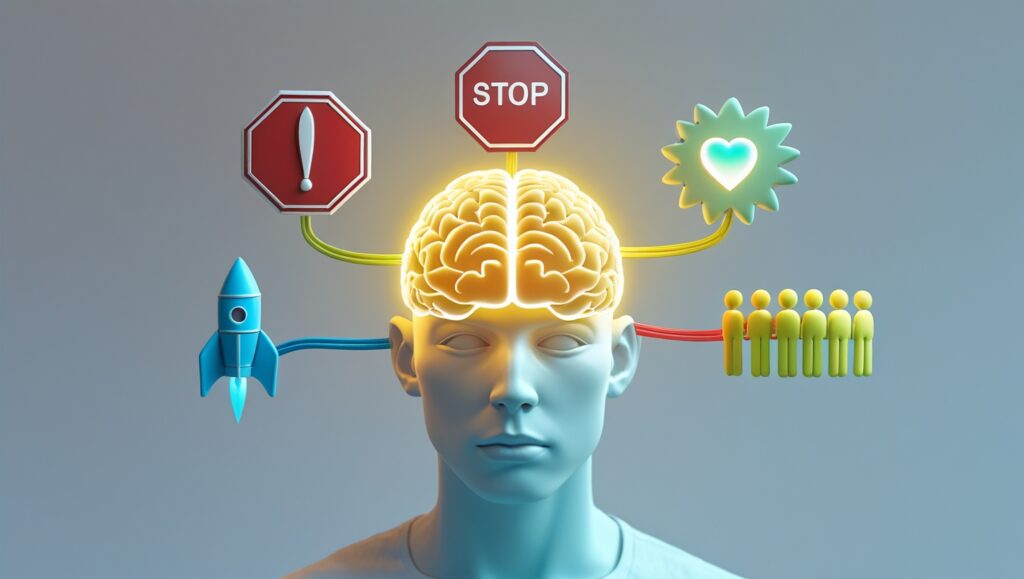Why is it that some people stay composed in a crisis while others feel overwhelmed?
Often, the difference comes down to emotional intelligence (EQ) — the ability to notice, understand, and manage not only your own emotions but also the emotions of those around you.
While IQ reflects logical thinking and problem-solving, EQ shapes how you respond to stress, build relationships, and navigate everyday challenges.
When your emotional intelligence is strong, it can change the way you live and work. You communicate more clearly, make thoughtful decisions, and form deeper, more meaningful connections. At work, EQ helps you collaborate effectively, lead with empathy, and resolve conflicts. In your personal life, it fosters self-awareness, compassion, and the ability to bounce back from setbacks.
So, how do you develop it?
This guide will break down the key aspects of emotional intelligence and offer actionable tips to help you enhance it . Whether your goal is to perform better at work, improve your relationships, or simply feel more in control of your emotions, understanding EQ is the first step.
Let’s get started.
What is Emotional Intelligence?
Emotional intelligence, or EQ, refers to the skill of identifying, comprehending, and effectively managing emotions—both your own and those of others. It influences how we handle relationships, make decisions, and deal with challenges. Unlike IQ, which measures logic and reasoning, EQ focuses on emotional awareness and social skills.
The concept of EQ was popularized in the 1990s through the work of psychologist Daniel Goleman. He argued that emotional intelligence is as important to success as IQ. His research shows that people with high EQ have better leadership skills, stronger relationships, and better mental health.
EQ vs IQ: What’s the Difference?
IQ (Intelligence Quotient): Measures cognitive abilities like problem-solving, logic, and memory
EQ, or Emotional Quotient, relates to your emotional abilities, including self-awareness and how you interact with others.
While IQ helps you excel academically, EQ determines how well you navigate life. A person with a high IQ but low EQ may struggle with communication, teamwork, or dealing with stress. On the other hand, a person with strong emotional intelligence builds better relationships, resolves conflicts effectively, and remains resilient under pressure.
Understanding the definition of emotional intelligence and developing key emotional skills can increase personal and professional success. By improving your emotional awareness and self-regulation, you can enhance decision-making, strengthen relationships, and live a more fulfilling life. (mindfulness techniques to boost EQ)
Would you like to know how to improve your EQ? Let’s explore more!

The Five Components of Emotional Intelligence
Emotional intelligence is built on five essential traits that shape how we understand and manage emotions. These qualities influence relationships, decision-making, and overall success in life. (Daniel Goleman’s EQ framework)
Self-Awareness
Self-awareness is the skill of noticing and understanding your emotions in the moment they arise. This helps individuals assess their strengths and weaknesses, be mindful of their reactions, and be open to feedback. People with strong self-awareness can manage their emotions without being overwhelmed by them.You can strengthen this skill through daily meditation practices and regular self-reflection
Self-Regulation
Managing emotions effectively is essential for maintaining balance and control. Rather than reacting emotionally, self-regulation allows individuals to stay level-headed, adapt to challenges, and handle stress with a level-headed approach. This trait helps maintain professionalism and builds confidence.Learning how to stop procrastinating can also improve self-control and decision-making.
Motivation
Motivation goes beyond external incentives—it’s the inner drive that pushes you to chase goals with persistence and strength. People who cultivate this trait stay focused, overcome setbacks, and maintain a positive outlook even in difficult situations. Their passion for growth keeps them striving for success.You can boost this by setting SMART goals and celebrating small wins.
Empathy
Understanding and sharing the feelings of others strengthens bonds and improves communication. Empathy allows individuals to see different perspectives, respond with compassion, and build meaningful relationships. It plays a key role in leadership, teamwork, and conflict resolution. (Greater Good Science Center on empathy). Practicing mindset shifts for success can also improve your ability to relate to others
Social Skills
Strong social skills help individuals navigate interactions effectively. These include active listening, communication, teamwork, and the ability to positively influence others. People with well-developed social skills can foster cooperation, resolve conflict, and maintain strong relationships.If you want to enhance your workplace connections, check out how to improve workplace efficiency and maximize productivity.
By developing these five traits, individuals can enhance personal growth, strengthen relationships, and improve their ability to cope with life’s challenges.
Why is Emotional Intelligence Important?
Emotional intelligence is essential for success in both personal and professional aspects of life. It helps individuals understand emotions, build relationships, and handle challenges effectively. Unlike IQ, which measures cognitive abilities, EQ strengthens emotional resilience, decision-making, and communication.
Benefits in Personal Life
A strong EQ leads to better relationships and emotional well-being. People who understand their emotions can manage stress, communicate effectively, and express themselves clearly. This reduces misunderstandings and strengthens relationships with family and friends.(APA on emotional well-being).
In addition, EQ improves mental health. Those with emotional awareness are better able to handle negative feelings, reducing anxiety and emotional burnout. Self-awareness and self-control create inner stability, making it easier to cope with life’s ups and downs.
Benefits in Professional Life
At work, EQ is essential for leadership, teamwork, and workplace success.Leaders with strong emotional intelligence motivate their teams, communicate effectively, and make well-considered decisions. They remain calm under pressure and resolve conflicts with empathy.
For employees, strong social skills and emotional awareness improve teamwork. Understanding emotions helps in navigating workplace dynamics, leading to smoother collaborations. It also helps in conflict resolution, allowing individuals to manage disagreements professionally.You can strengthen these skills by learning time management techniques and effective focus strategies
Why EQ Matters More Than Ever
In today’s fast-paced world, emotional health is just as important as technical skills. Whether in personal relationships or at work, a well-developed EQ leads to greater personal growth and success. By improving emotional intelligence, individuals can increase self-confidence, strengthen relationships, and create a more fulfilling life.To get started, check out how to build self-discipline and habits that boost productivity.
How to Develop Emotional Intelligence
Emotional intelligence isn’t fixed – it can be improved with practice. By strengthening key emotional skills, you can build better relationships, manage stress, and increase personal and professional success. Here’s how to improve emotional intelligence step by step.
Strengthen Self-Awareness
Self-awareness is the foundation of emotional growth. It helps you understand your emotions and how they influence your thoughts and actions.
- Practice mindfulness. Pay attention to your emotions in the moment. Notice how they affect your behavior.(Mindfulness guide from Greater Good Science Center). You can also try a daily meditation routine to sharpen awareness.
- Keep a journal. Write about your feelings daily. Reflect on emotional triggers and patterns.
- Ask for feedback. Others can offer insights into how you express emotions.
Master Self-Regulation
Managing emotions effectively prevents impulsive reactions and reduces stress.
- Pause before reacting. Take a deep breath before responding in emotional situations.
- Practice relaxation techniques. Deep breathing, meditation, and exercise help regulate emotions.
- Reframe negative thoughts. Replace self-doubt with constructive thinking.
Boost Motivation
A powerful inner drive propels both personal and professional development.
- Set meaningful goals. Choose goals that align with your values and passions.Use the SMART goal setting guide to stay focused
- Stay positive. Focus on progress, not setbacks. Learn from failures instead of dwelling on them.
- Surround yourself with positive influences. Supportive people encourage motivation and resilience.
Cultivate Empathy
Empathy helps you understand others and build stronger connections.
- Practice active listening. Focus fully on the speaker. Avoid interrupting or forming responses too soon.
- Put yourself in others’ shoes. Try to see situations from different perspectives.
- Observe nonverbal cues. Pay attention to facial expressions and body language.
Improve Social Skills
Strong social abilities help in both personal and professional relationships.
- Enhance communication. Be clear, concise, and open in conversations.
- Manage conflicts calmly. Focus on solutions instead of blame.
- Develop networking skills. Build relationships by engaging with people in meaningful ways.
Emotional Intelligence in Everyday Life
Emotional intelligence isn’t just a concept—it’s a skill used daily. From work to relationships and parenting, real-life EQ helps in managing emotions, handling conflicts, and building strong connections.
At Work
In the workplace, emotional intelligence enhances communication, collaboration, and leadership effectiveness.
- Handling criticism: Instead of reacting defensively, emotionally intelligent people listen, reflect, and use feedback for growth.
- Leading a team: A good leader stays calm under pressure, motivates others, and resolves conflicts with empathy.
- Managing stress: Recognizing emotions helps in staying composed, even in high-pressure situations.(stress management tips).
In Relationships
EQ strengthens bonds by improving understanding and conflict resolution.
- Resolving conflicts: Instead of arguing, emotionally aware individuals listen, acknowledge feelings, and find solutions.
- Showing empathy: A partner who recognizes emotions can respond with kindness and support.
- Communicating effectively: Emotionally intelligent people express themselves clearly without being overly reactive.
In Parenting
Teaching emotional intelligence in parenting helps children develop emotional resilience.
- Helping kids manage emotions: Parents with high EQ guide children in naming and processing their feelings.
- Being patient: Instead of reacting with frustration, they stay calm and set a positive example.
- Encouraging empathy: Teaching kids to understand others’ emotions helps them build better relationships.

Common Myths About Emotional Intelligence
Emotional intelligence is often misunderstood. Many believe myths that limit their ability to develop EQ. Let’s debunk some common misconceptions.
Myth 1: EQ Is Just About Being Nice
Some people assume emotional intelligence is simply about being nice. In truth, it’s the ability to understand and manage emotions effectively. At times, EQ involves setting clear boundaries, delivering constructive criticism, or making tough choices with empathy. It’s not about steering clear of conflict—it’s about addressing it with wisdom and care.
Myth 2: EQ Matters Less Than IQ
While some see intelligence (IQ) as the main driver of success, IQ mainly supports problem-solving abilities. Emotional intelligence (EQ), however, often has a greater impact on leadership, collaboration, and relationship-building. Many high achievers possess average IQs but thrive because of strong emotional skills. Research suggests that EQ can be a stronger predictor of career success than IQ.
Myth 3: EQ Cannot Be Improved
Many assume emotional intelligence is fixed, but that’s false. EQ can be developed through practice, like self-awareness exercises, stress management, and improving communication. Anyone can strengthen their emotional skills with effort and consistency.
Conclusion
Emotional intelligence is the ability to understand, manage, and use emotions effectively. It is made up of five key components: self-awareness, self-regulation, motivation, empathy, and social skills. These traits help improve relationships, decision-making, and overall well-being.
EQ holds significant value in both personal and professional spheres. It strengthens communication, reduces stress, and enhances leadership. Unlike IQ, which focuses on logic, EQ helps navigate emotions and social interactions. The good news? It can be developed with practice.
Start small. Pay attention to your emotions, manage stress, and practice empathy. Improve your listening skills and handle conflicts calmly.Each step you take moves you toward a life with greater emotional intelligence.
Now, take action. Start practicing an EQ skill today and see the difference! Whether it’s journaling, pausing before reacting, or listening more attentively, every effort counts. Develop your emotional intelligence and open up new opportunities for personal growth and success!



